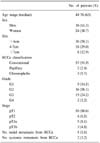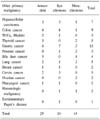Abstract
Purpose
This study aimed to evaluate the incidence, nature and prognosis of multiple primary malignancies in renal cell carcinoma.
Materials and Methods
From June 1995 to April 2004, we retrospectively reviewed the records of 578 patients who underwent an operation for renal cell carcinoma at Yonsei University. The incidence of other primary malignancies, in addition to the renal cell carcinoma, was determined and classified as antecedent, synchronous or metachronous. We analyzed the influence of the other primary malignancies on the prognosis, and the overall survival rates of the patients with multiple primary malignancies were compared to the remaining patients.
Results
Of the 578 patients, 62 patients (10.7%) had at least one malignancy beside renal cell carcinoma. In these cases, renal cell carcinoma was commonly incidental, small or low stage (75.8%). 22 patients (35.4%) had gastrointestinal cancer and 11 patients (17.7%) had hepatobiliary cancer. The malignancies were antecedent in 25 (40.3%), synchronous in 24 (38.1%), and metachronous in 14 patients (22.2%). On the analysis of overall survival with using the log rank test, there was no statistically significant factor for the presence of other antecedent or synchronous malignancies.
Conclusions
Primary malignancy associated with renal cell carcinoma in the Korean population shows a different pattern from that of Western countries. The expected survival rate of patients suffering from renal cell carcinoma with tumor involvement of other organs, if surgically treated, is similar to that of renal cell carcinoma alone, so aggressive surgical treatment of renal cell carcinoma should be performed.
Figures and Tables
References
1. Billroth T. Die allgemeine chirurgische pathologie und therapie in 51 vorlesungen: ein handbuch fûr stuierende und aerzte. 1889. Berlin: G Reimer;908.
2. Franksson C, Bergstrand A, Ljungdahl I, Magnusson G, Nordenstam H. Renal carcinoma (hypernephroma) occurring in 5 siblings. J Urol. 1972. 108:58–61.
3. Matzkin H, Braf Z. Multiple primary malignant neoplasms in the genitourinary tract: occurrence and etiology. J Urol. 1989. 142:1–12.
4. Nakata S, Kato Y, Sato J, Mayuzumi T, Kumasaka F, Shimizu T. Analysis of multiple primary cancers in patients with urologic cancer. Int J Clin Oncol. 1997. 2:40–46.
5. Sato S, Shinohara S, Suzuki S, Harabayashi T, Koyanagi T. Multiple primary malignancies in Japanese patients with renal cell carcinoma. Int J Urol. 2004. 11:269–275.
6. Rabbani F, Grimaldi G, Russo P. Multiple primary malignancies in renal cell carcinoma. J Urol. 1998. 160:1255–1259.
7. Warren S, Gates O. Multiple primary malignant tumors. A survey of the literature and a statistical study. Am J Cancer. 1933. 16:1358–1414.
8. Ray P, Sharifi R, Ortolano V, Guinan P. Involvement of the genitourinary system in multiple primary malignant neoplasms: a review. J Clin Oncol. 1983. 1:574–581.
9. Kang HJ, Choi S, Kim JC, Rhew HY. Multiple primary malignant neoplasms in genitourinary tract. Korean J Urol. 1994. 35:1265–1270.
10. Chung SU, Park JY, Kim CS. Clinical manifestations of multiple primary neoplasms in urologic patients. Korean J Urol. 1999. 40:1098–1102.
11. Lee JS, Kim JH, Choi YD. Characteristics of multiple primary malignant neoplasms associated with the urinary tract malignancy. Korean J Urol. 2001. 42:1033–1037.
12. Hajdu SI, Thomas AG. Renal cell carcinoma at autopsy. J Urol. 1967. 97:978–982.
13. Kantor AF, McLaughlin JK, Curtis RE, Flannery JT, Fraumeni JF Jr. Risk of second malignancy after cancers of the renal parenchyma, renal pelvis, and ureter. Cancer. 1986. 58:1158–1161.
14. Rabbani F, Reuter VE, Katz J, Russo P. Second primary malignancies associated with renal cell carcinoma: influence of histologic type. Urology. 2000. 56:399–403.
15. Kantor AF, McLaughlin JK. Second cancer following cancer of the urinary system in Connecticut, 1935-82. Natl Cancer Inst Monogr. 1985. 68:149–159.
16. Greenberg RS, Rustin ED, Clark WS. Risk of genitourinary malignancies after cancer of the prostate. Cancer. 1988. 61:396–401.
17. Tihan T, Filippa DA. Coexistence of renal cell carcinoma and malignant lymphoma. A causal relationship or coincidental occurrence? Cancer. 1996. 77:2325–2331.




 PDF
PDF ePub
ePub Citation
Citation Print
Print






 XML Download
XML Download